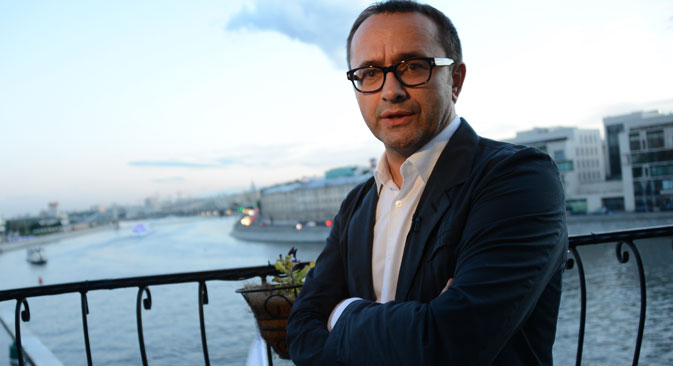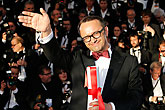Andrey Zvyagintsev: Conflict of the man and the system is a universal story

Andrey Zvyagintsev. Source: Ekaterina Chesnokova / RIA Novosti
Andrey Zvyagintsev’s Leviathan, a film showing a battle of an individual with a state machine, corrupt bureaucracy and truculent church, which has been labelled as the first frank portrayal of a corrupt Russia, won the best film award at the 45th International Film Festival of India in Goa last Sunday. Alexey Serebryakov who played Nicolay in the film shared the best male actor award with Dulal Sarkar (Chotoder Chobi).
Before taking back home the Golden and Silver Peacocks and the cash prize, Andrei Zvyagintsev spoke to RIR about his new masterpiece and its universality.
Andrey Petrovich, is it your first time in India? Have any of your other films participated in IFFI before?
I have been to India already. To be honest, I do not remember exactly whether our other films except for Elena participated in the festival, but Elena won the IFFI award for Best Actress (Female) in 2011. The prize was awarded to Nadezhda Markina, however even that time just as now I represented actors here at the ceremony. This time we were even luckier since not only Alexei Serebriakov won the award for the main male role but the film itself won the main prize. It's quite pleasant.
Leviathan was awarded Best Screenplay at the Cannes festival in May, it won the top prize of the London Film Festival. Recently, the Russian Oscar Committee nominated it to compete for Oscar in the category of Best Foreign Language Film. Which of these is more important for you?
I do not think about awards this way. The prize is recognition of the work you have done, it asserts that you had done a good job. It is only a detached onlooker who can judge, compare, sometimes underestimate, sometimes overestimate. If a film wins a prize no matter where and which, it is a recognition of your efforts. And regarding the Oscars, it is yet too early to talk about it. Cannes has already happened but the Oscars finalists will be announced on February 22. We have not yet hit the top-5 of the nominees, we are in the long list of submission from 86 countries. Whether Leviathan will be short-listed, God only knows.
What does it mean for you to win the top prize in the Indian film festival?
The film had already won a lot of prizes, to single out one would be strange at least. But some festivals, including the one in Goa, follow the tradition of accompanying the award itself with a cash prize. The people in the film industry, unless they are into entertainment or commercial cinema, do not get abundant financial rewards, so such cash prize is a good support. I am very happy that in Goa this tradition is still followed and winning films get rewarded financially as well.
You have often said that your first films, The Return (2003) and The Banishment (2007) are kind of universal stories in isolation from the specific geographical, historical reality and time. The other films Elena (2011) and Leviathan (2014) are different. They are clearly grounded in Russian realities. Could Leviathan be a film about America, or, for example, India?
The Return and The Banishment are completely devoid of binding to a specific social environment. In The Banishment we had an aesthetic purpose of creating such an environment where it would be difficult to say where and in which time the action is taking place. We have created a complete special and timely time and “nowhere” in the film. The only thing that gives the film some identity is the Russian language in which the actors speak. The Return is also detached from any specific social reality. It is a story of the relationships of father and his children. We again blurred the boundaries of time, it is not clear when these events occur, but it is quite obvious that it is Russia.
Elena and Leviathan, on the contrary, are grounded in the Russian realities. The story of Leviathan, its texture, the scene, all that the film is breathing with is, no doubt, today’s Russia of 2013 – 2014. However the story is quite universal. It is a clash of the state machine with a small man whose role in the social life is insignificant. The conflict of the man and the system is a universal story. It could have happened anywhere.
I am often criticized for the fact that my films are not rooted in any reality, the claim to be a parable which does not talk about places and times but people. It’s not that I was tired of these accusations and decided to make different kind of film, but Leviathan’s story conceptualized after I heard a story that happened in America.
A man was living in Colorado in a tiny town, he had an automobile muffler repair shop. There was an abandoned cement factory nearby. Its new owners who decided to buy land around the plant, including the plot owned by the man. After round of arguments, the company bought all the land around his house and put a fence blocking the access to his house. He went to court, he spoke the sheriff, the mayor of the city and many other officials. He sought justice. At last, do you know what he did?
He bought steel sheets, welded them together and armoured a bulldozer, took a gun and a megaphone, sealed himself inside and drove the bulldozer through the fence of the cement plant and went to the city. The police shot more than 200 bullets, but he was invulnerable. Methodically, one by one he destroyed 11 buildings, including the town hall and other government offices and private homes of those who did a bad turn to him. In the end, he got stuck in the basement of a building and then he said something on the lines of ‘nobody was listening to me, now all have heard.’ And he shot himself.
It happened 10 years ago. I learnt about this story in 2008. It took me a lot of time and efforts to get the attention of my co-writer and friend Oleg Negin with this idea and finally I managed to get it. Although we were not happy about many things in this story, we finally found a key and the story was written. The fable of the film story coincides with this collision. But six months before filming had started we decided to change the ending.
Well, you must see the movie to understand what I'm talking about. But when you watch the film... remember this story about a man named Marvin John Heemeyer. You will watch the movie and wonder how that story turned into this one.
Do you see any future prospects of cooperation between Russian and Indian cinematographers, have you ever thought of co- joint projects with the Hindi film industry?
There were some precedents of such cooperation, to my knowledge. It all depends on the idea, the script, the story. Say, Slumdog Millionaire can be shot only in India, the story was written as Indian project initially. It all depends on the ideas and not on the desire to do this or that production, to make a movie in cooperation with Bollywood. Although, of course, ideas come from desire. But ideas that excite me are not any kind of strategy, a plan, I do not set any strategic goals. These ideas are snatched from the surroundings, they come from my observation of life and people.
This interview was edited and condensed for clarity.
Catherine Belyakova contributed to this report.
All rights reserved by Rossiyskaya Gazeta.
Subscribe
to our newsletter!
Get the week's best stories straight to your inbox


